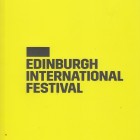Kingdom 2019Edinburgh International Festival
Read more about the opera Kingdom
Elgar's final oratorio is nowadays something of a rarity in our concert halls. It is a lovely work, beautifully orchestrated, with lots of wonderful opportunities for the choir to shine. Perhaps the soloists' roles are less showy, but then the climax is the justly famous soprano aria 'The sun goeth down', requiring the purest of tone to complement an achingly beautiful violin solo. The young Welsh soprano Natalya Romaniw gave a majestic performance. Roderick Williams provided excellent support as Peter.
The last few days before the performance must have given the Festival management something of a nightmare. Not only did the scheduled conductor, Sir Mark Elder, suffering from a trapped nerve, drop out from a piece he had worked on intensively with his Hallé forces. In addition, they had to find replacements for the alto (Alice Coote) and tenor (Michael Fabiano). There cannot be many leading singers with this work in their repertoire. In the event, Catherine Wyn-Rogers, arguably the leading Elgarian mezzo of the present day, joined the team seamlessly. Perhaps more surprising was the success of the tenor David Butt Philip, previously seen only in two Puccini roles at the Perth Festival.
The new conductor was Martyn Brabbins, familiar from his many years working with the BBC SSO in Glasgow, and now in charge at ENO. He is renowned for the speed with which he can absorb unfamiliar music (especially for his many recordings) and led the assembled forces in a superbly accomplished performance to follow up the wonderful Apostles given a few years ago.
The Festival's opera programme
The opera programme for the 2019 Edinburgh International Festival included two fully-staged productions. The Komische Opera, Berlin, last here in 2015, brought a staging by director Barrie Kosky of Tchaikovsky's Eugene Onegin. Scottish Opera's contribution was the European premiere of the noted American compoer Missy Mazzoli's interpretation of Breaking the Waves, an uncompromisingly bleak view of life in the Scottish Highlands and Islands, as depicted in the 1996 film by Lars von Trier.
The series of notable concert performances featured Götterdämmerung, bringing to a climax the Festival's four-year cycle of Wagner's Ring. A second Berlin company, the Deutsche Oper, led by its Scottish conductor, Donald Runnicles, brought Puccini's rare early Manon Lescaut featuring Sondra Radvanovsky in the title role. Iestyn Davies led the cast in a performance of Gluck's Orfeo ed Euridice.
Even more unusual than the Elgar was the celebration of Leonard Bernstein's centenary - a concert presentation by Sir John Eliot Gardiner and the Scottish Chamber Orchestra of his great musical West Side Siory. In addition, the opening concert brought the Los Angeles Philharmonic and their charismatic conductor Gustavo Dudamel in Mahler's inspiring 'Resurrection' Symphony. And the Orchestre de Paris brought Britten's War Requiem.
